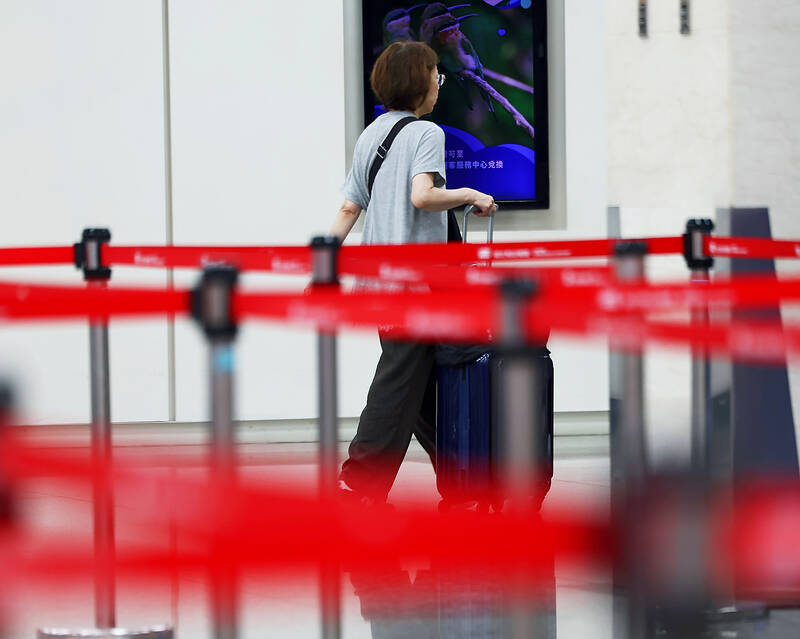About nine Taiwanese are “disappeared,” detained, or otherwise deprived of freedom of movement in China each month, the Mainland Affairs Council (MAC) said yesterday.
Between Jan. 1 last year and Aug. 31 this year, 188 Taiwanese travelers went missing, were detained and interrogated, or had their personal freedom restricted, with some questioned in airports or hotel lobbies, the council said.
In a statement ahead of the Mid-Autumn Festival, the council urged people visiting China for any reason to be highly vigilant and aware of the risks.

Photo: CNA
Of the reported cases, 50 people were “disappeared” after entering China, 19 were detained and 119 had their movement restricted in some form, the MAC said on social media on Wednesday.
The figures include previously known incarcerations of I-Kuan Tao members, Taiwanese businesspeople and others involved in alleged scamming operations, a source with knowledge of the matter said.
In one case, a Taiwanese on a five-day trip was told their identification was “problematic” when checking in at an airport, the source said.
Authorities refused to explain, took the traveler to a side room and demanded that they unlock their phone for questioning, they said.
The person allegedly overheard one officer whisper, “We have the wrong person,” before being released after more than an hour, they added.
In another case, a Taiwanese couple traveling in China’s Shanxi Province said the wife was shouted at in their hotel lobby and nearly taken away, the source said.
The couple only learned after returning to Taiwan earlier than planned that the unknown person was part of a security task force of local officials who were meeting at the hotel that day, they said.
One of the people cited told the Central News Agency that the cases highlight the absence of the rule of law in China, where everything is centered around national security without regard for human rights.
The council said that Beijing’s promotion of cross-strait religious dialogue is merely superficial, as any activity failing to serve its “united front” agenda would be curtailed or suppressed.
The council had raised the travel alert to China, Hong Kong and Macau to “orange,” the third-highest level used for countries and areas where unnecessary travel is advised against, after China issued the 22-point set of “guidelines” to penalize “diehard” Taiwanese independence separatists.

Taiwan has received more than US$70 million in royalties as of the end of last year from developing the F-16V jet as countries worldwide purchase or upgrade to this popular model, government and military officials said on Saturday. Taiwan funded the development of the F-16V jet and ended up the sole investor as other countries withdrew from the program. Now the F-16V is increasingly popular and countries must pay Taiwan a percentage in royalties when they purchase new F-16V aircraft or upgrade older F-16 models. The next five years are expected to be the peak for these royalties, with Taiwan potentially earning

STAY IN YOUR LANE: As the US and Israel attack Iran, the ministry has warned China not to overstep by including Taiwanese citizens in its evacuation orders The Ministry of Foreign Affairs (MOFA) yesterday rebuked a statement by China’s embassy in Israel that it would evacuate Taiwanese holders of Chinese travel documents from Israel amid the latter’s escalating conflict with Iran. Tensions have risen across the Middle East in the wake of US and Israeli airstrikes on Iran beginning Saturday. China subsequently issued an evacuation notice for its citizens. In a news release, the Chinese embassy in Israel said holders of “Taiwan compatriot permits (台胞證)” issued to Taiwanese nationals by Chinese authorities for travel to China — could register for evacuation to Egypt. In Taipei, the ministry yesterday said Taiwan

‘LIKE-MINDED PARTNER’: Tako van Popta said it would be inappropriate to delay signing the deal with Taiwan because of China, adding he would promote the issue Canadian senators have stressed Taiwan’s importance for international trade and expressed enthusiasm for ensuring the Taiwan-Canada trade cooperation framework agreement is implemented this year. Representative to Canada Harry Tseng (曾厚仁) in an interview with the Central News Agency (CNA) said he was increasingly uneasy about Ottawa’s delays in signing the agreement, especially as Ottawa has warmed toward Beijing. There are “no negotiations left. Not only [is it] initialed, we have three versions of the text ready: English, French and Mandarin,” Tseng said. “That tells you how close we are to the final signature.” Tseng said that he hoped Canadian Prime Minister Mark Carney

POSITIVE DEVELOPMENT: Japan and the US are expected to hold in-depth discussions on Taiwan-related issues during the meeting next month, Japanese sources said The holding of a Japan-US leaders’ meeting ahead of US President Donald Trump’s visit to China is positive news for Taiwan, former Japan-Taiwan Exchange Association representative Hiroyasu Izumi said yesterday. After the Liberal Democratic Party’s landslide victory in Japan’s House of Representatives election, Japanese Prime Minister Sanae Takaichi is scheduled to visit the US next month, where she is to meet with Trump ahead of the US president’s planned visit to China from March 31 to April 2 for a meeting with Chinese President Xi Jinping (習近平). Japan and the US are expected to hold in-depth discussions on Taiwan-related issues during the